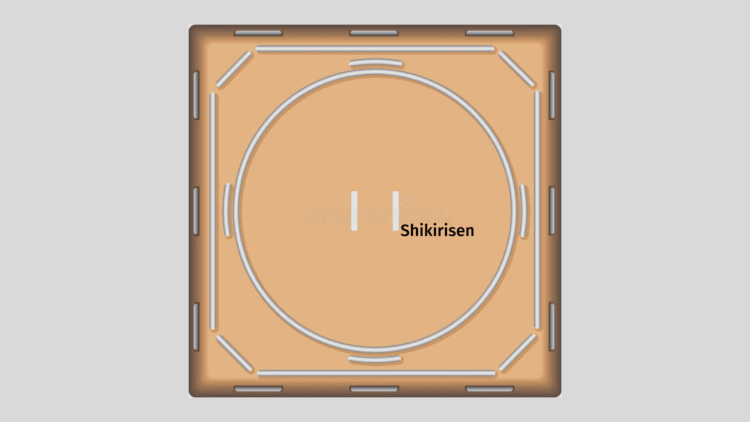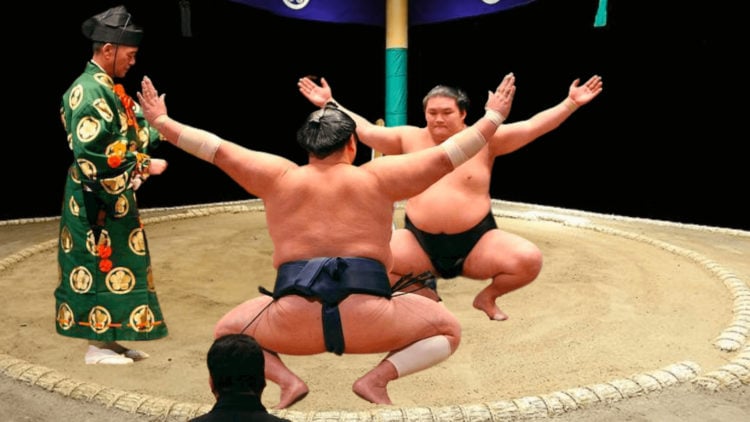
OBJECTIVE OF SUMO WRESTLING: Push the opponent out of the wrestling ring or force the opponent to fall to the floor.
NUMBER OF PLAYERS: 2 players
MATERIALS: Appropriate sumo clothing
TYPE OF GAME: Sport
AUDIENCE: 15+
OVERVIEW OF SUMO WRESTLING
In ancient times, Sumo was a ritual often accompanied by sacred dances to the gods to pray for a bountiful harvest. Although Sumo has become a professional competitive sport, it still retains a lot of Shinto rituals, making this sport all the more exciting and beautiful to watch.
SETUP

DOHYO
The sumo ring (also called a dohyo) is a raised square platform made of clay and straw bales. The dohyo wrestling circle within the square platform is a diameter of approximately 15 feet. The roof of the ring is also modeled after the roof architecture of a Shinto shrine.
Two white lines are drawn in the middle of the dohyo and are called shikirisen. These lines are repainted every day.
GYOUJI
Gyouji (referees) in sumo matches often wear traditional costumes that resemble those of judges from the Heian period and hats that resemble those of Shinto priests. Before each tournament, the gyouji perform a ritual to purify the dohyo by burying items in the center.
SUMO RANKS
There are six sumo divisions. These divisions are organized by skill level. From highest to lowest, they are:
- Makuuchi: the most prestigious level only 42 wrestlers are allowed in this division. Makuuchi is also divided into 5 sub-ranks: yokozuna (highest), ozeki, sekiwake, komusubi, and maegashira.
- Juryo
- Makushita
- Sandanme
- Jonidan
- Jonokuchi
GAMEPLAY

PRE-MATCH RITUALS
The fighters put on the mawashi (traditional sumo uniform) and enter the ring, lined up in a circle, facing the audience. They then turn around, face each other in a circle, clap their hands, and raise their arms.
Before each match, two sumo wrestlers go to the corner of the stands, pick up a handful of salt and sprinkle them on the floor, then look down at each other, preparing to “go into battle.” This is a purification ritual in shinto called the salting ceremony.
Sumo wrestlers must crouch on the floor with both their fists on the ground, waiting for the signal to start.
WRESTLING
The objective of the game is simple: either throw your opponent out of the dohyo by pushing or forcing them out or forcing the opponent to the ground.
KINJITE
Kinjite are fouls that may cause a sumo wrestler to lose a match. Any of the following moves are forbidden in sumo wrestling:
- Hair pulling
- Punching
- Striking both ears at the same time
- Attacking the groin area
- Choking
- Poking the eyes
- Bending the fingers back
- Kicking the chest
Another foul that can lead to losing the match is if the sumo wrestler’s belt becomes undone.
TIME
Sumo matches are usually very short, usually under a minute (most are only a few seconds). If a match goes on for more than 4 minutes, the referee will give a drink break, also called mizuiri.
END OF GAME
The winner of a sumo match is the one who pushes his opponent out of the wrestling ring or forces his opponent to the ground. If a player commits a foul at any point during the match, they lose it even if they “win” by any other account.
- 30 GAMES TO PLAY OVER TEXT - April 22, 2024
- 20+ FREE PRINTABLE BABY SHOWER GAMES - April 16, 2024
- 20+ College Party Games for the Best Night Ever! - April 2, 2024